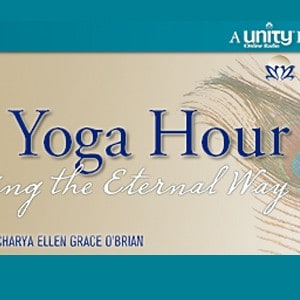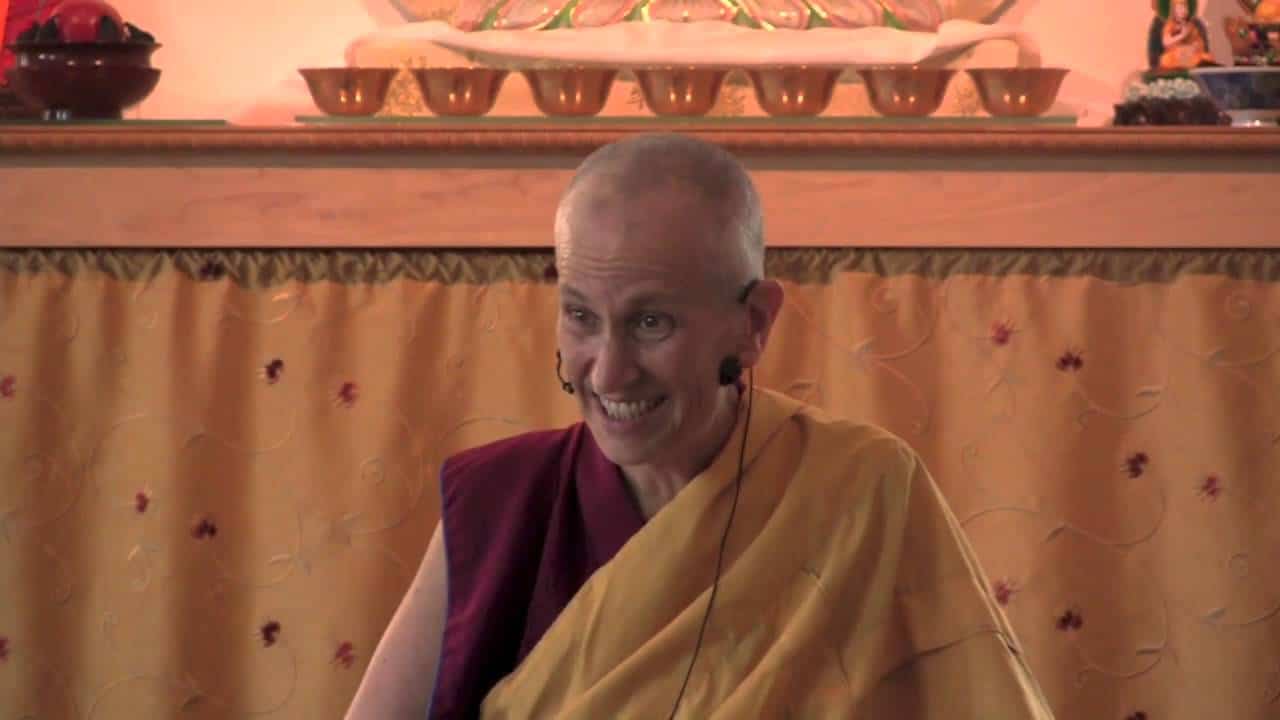Being fearless in making life meaningful
Part of a series of teachings on the text The Essence of a Human Life: Words of Advice for Lay Practitioners by Je Rinpoche (Lama Tsongkhapa).
- Appreciating our freedom to practice a spiritual path
- Acknowledging our internal freedom and fortune, seeking a path
- Respecting the spiritual interest in ourselves and others
- Living according to our spiritual yearning and values, not looking for simple answers
The Essence of a Human Life: Being fearless in making life meaningful (download)
We’re still on the third verse. The second line of the third verse. We’re anchored there.
You of fine features, you have gained
This opportune and leisured human form.
If you follow me who speaks to help others,
Listen well, I have something to say.
This “opportune and leisured human form….” I started explaining yesterday about really giving thought to the factor of why are we born us. Why weren’t we born somebody else? What would it be like to be born somebody else? What would it be like to be born even in a different species, in a different form where we’re limited in terms of what we can think, what we can understand, by the body that we take? But even when we have a human life, to have a precious human life is another situation altogether. Like I was saying yesterday, just having a human body doesn’t mean we have a precious human life, because there are all these other conditions that need to go along with it, and all these conditions center on the ability of us to learn, understand, and practice a spiritual path. This is coming from the stages of the path to awakening, so of course the criteria in it are going to be the criteria for what kind of life enables us to practice the path the best.
Like I was saying yesterday, if you’re born in a country without the Dharma–maybe the Dharma never was taught there, or maybe it was a place where there was no religious freedom, where you really lived in dire fear of the authorities. And this was the situation in Tibet and China during the cultural revolution. It was the situation in Eastern Europe and Russia and Cuba for many decades, where you may have a spiritual yearning but how are you going to learn anything. And in many countries, impossible to learn the Buddha’s Dharma in any case even if you have freedom because there are no teachers there, there are no books in your own language.
When we think like this, that I could have been born in all these situations where it would have been very difficult to meet the Buddha’s teachings, or where I would’ve lived in fear of practicing them, or possibly been arrested or beaten because of practicing them, then we really have to come back to where we are now and see how incredibly fortunate we are.
But I think sometimes even more than the fortune in the external situation is the fortune in the internal situation–that we, from our side, have some kind of curiosity and interest and spiritual yearning.
My personal philosophy is I believe in everybody that’s there somewhere, but that it gets really buried due to the external situation, due to their conditioning, many things, due to the way their mind thinks. So even though those questions are always there about “why am I alive,” and “what’s the purpose of my life,” and, “what happens after death,” and, “what does it mean to live a meaningful life….” Although those questions are there, I think because they’re difficult to answer, and because the external society says, “forget that, just try and make money, that’s the source of happiness,” that therefore people do forget their spiritual interest and focus on doing what society says they should do in order to be happy.
We all grew up in families that, I don’t know about yours, but in mine, my parents didn’t have much spiritual interest, even in their own religion. They were the first generation born in this country so their goal was to get the American dream. So religion was, like, who cares about that? And yet, I cared about it. But if you’re born in a family like that, where you get that message all the time, then it’s easy to think, “Oh, well, yes, maybe I am a bit odd because I’m asking what the meaning of my life is. And maybe it isn’t quite normal to wonder if I want to get married and have kids.” Or any of these things that we’re inculcated to do since we were this big. Because our parents, when they have a baby, they have our whole life planned out because we’re going to have and be everything they weren’t able to have and be. Because that’s what they want, because they think it’s going to make us happy. But sometimes within their prescription for happiness there’s no Buddhadharma. There’s no thought about these important issues about life.
The fact that even growing up in that kind of family and that kind of culture, that we have this yearning, and that we see that there’s something beyond just what our senses tell us. We have some feeling there’s something more meaningful than just duplicating the lives of the people in People magazine. Or whatever magazine-people you choose to emulate. Some may want to emulate the Fortune 500 or 400, whatever it is. Some people want to emulate the sports heroes. Whatever it is. Seeing that, gee, maybe there’s something more important, more meaningful, more longer lasting than all of that.
Having that spiritual interest in our own heart is something to really respect and appreciate in ourselves. Instead of thinking, “Gee, maybe I’m odd,” to think, “Mmm, maybe I’m sane.” Yes? That I’m the sane one around here because I’m asking these kinds of questions. And other people may or may not understand, that’s okay, that’s their business. Our business is our own spiritual yearning and what are we going to do about it. So I think it’s important to respect that part of ourselves, and it’s important to respect that in other people as well, and to really create friendships with people who have that same kind of spiritual interest and spiritual yearning that we have. Because those people understand something about us that’s very important that (I don’t know about you) but my family totally doesn’t understand. So the people that do understand that part of us, that encourage us along that line, are quite important. So to respect them and to respect ourselves for having that interest.
And then to be fearless and live according to that interest and yearning, and not just look for simple answers, or simple labels, or that kind of stuff, but to really explore and investigate and examine and ask questions and think deeply about things. Because that’s a very important meaning that can be derived from this life that will influence how we die and what happens after we die. Because if we live our life just with the eight worldly concerns–the attachment to the happiness of this life–and we’re always looking for sense pleasure happiness and material possessions and money and fame and love and sex and … everything everybody normal looks for, you know? Appreciation and approval and praise…. If we just live our lives looking for all of that, and trying to get away from the opposite, then we wind up actually wasting a lot of time, because a lot of those things come and go very quickly. Money and material things come come, go go. Same with relationships with a lot of attachment–come come, go go. Fame is unreliable. Praise is unreliable because the next person’s going to turn around and criticize you.
The point of all of this is to be able to see that our happiness and wellbeing does not depend on the external world. It depends on what’s going on inside of here [our heart] and how we’re thinking and how we’re feeling and what our perspective on life is. Because we are creating our experience by how we look at things. And so to really see that having a meaningful life means changing what’s in here [our heart], and establishing priorities that are meaningful in the long-term. Our money and material things we can’t take with us, so if we have them, use them to benefit others. Use them to create goodness in our own hearts, instead of clinging on to them with stinginess. If we have praise and a good reputation instead of going around with our nose in the air, think “this enables me to be of greater benefit to others.” So, what do I have in myself that I can benefit others with? And if my mind is totally berserky and filled with ignorance, anger, and attachment, and jealousy and pride and laziness and excuse making, how am I ever going to benefit anybody? So if I want to benefit others I need to get what’s in here [the heart/mind] in order, and have good priorities, have good values, have good ethical precepts and conduct. Because that will really influence this life, influence our death, and give us something positive to take with us to the next life. Because what we need is the merit, or internal goodness, that we create through transforming our minds, and that will go on with us to the next life. Our whole collection of junk in this life, it stays here. It stays completely here. All of our scrapbooks and mementos, all this kind of stuff. Can’t take it with to the future life.
Anyway, we won’t even be us, so we’ll find that stuff totally boring. [laughter] Because it’s only interesting when it’s about me, isn’t it? I mean, if we all pulled out all of our childhood pictures and scrapbooks, do you want to look at each other’s scrapbooks? Maybe for two minutes, to see what each other looked like when we were little kids, but after that it’s like … [cross-eyed]. Isn’t it? [laughter] Interesting for a few minutes, see what somebody looked like, but…
So let’s really have a mind that wants to make our life meaningful and that is fearless in the process of doing that.
Venerable Thubten Chodron
Venerable Chodron emphasizes the practical application of Buddha’s teachings in our daily lives and is especially skilled at explaining them in ways easily understood and practiced by Westerners. She is well known for her warm, humorous, and lucid teachings. She was ordained as a Buddhist nun in 1977 by Kyabje Ling Rinpoche in Dharamsala, India, and in 1986 she received bhikshuni (full) ordination in Taiwan. Read her full bio.


